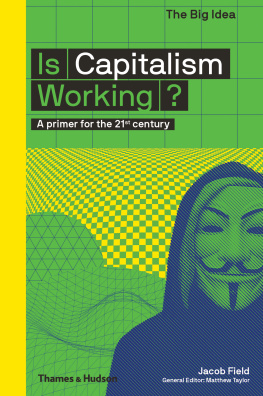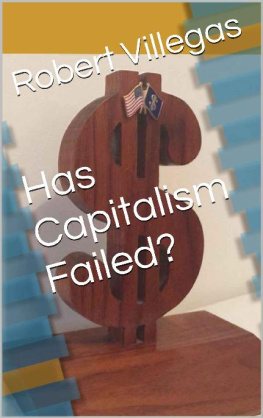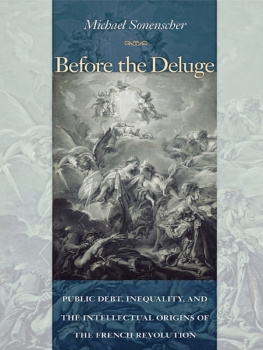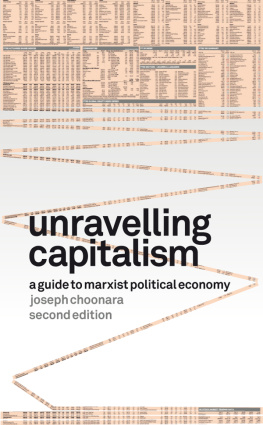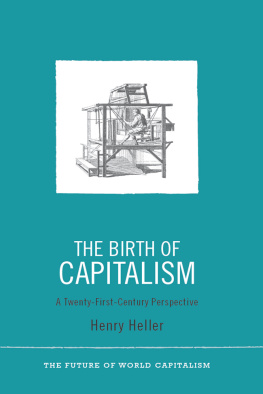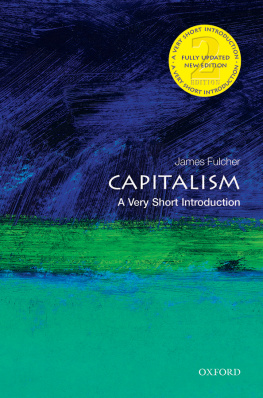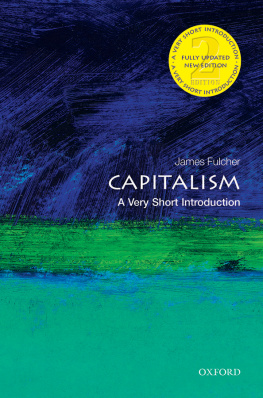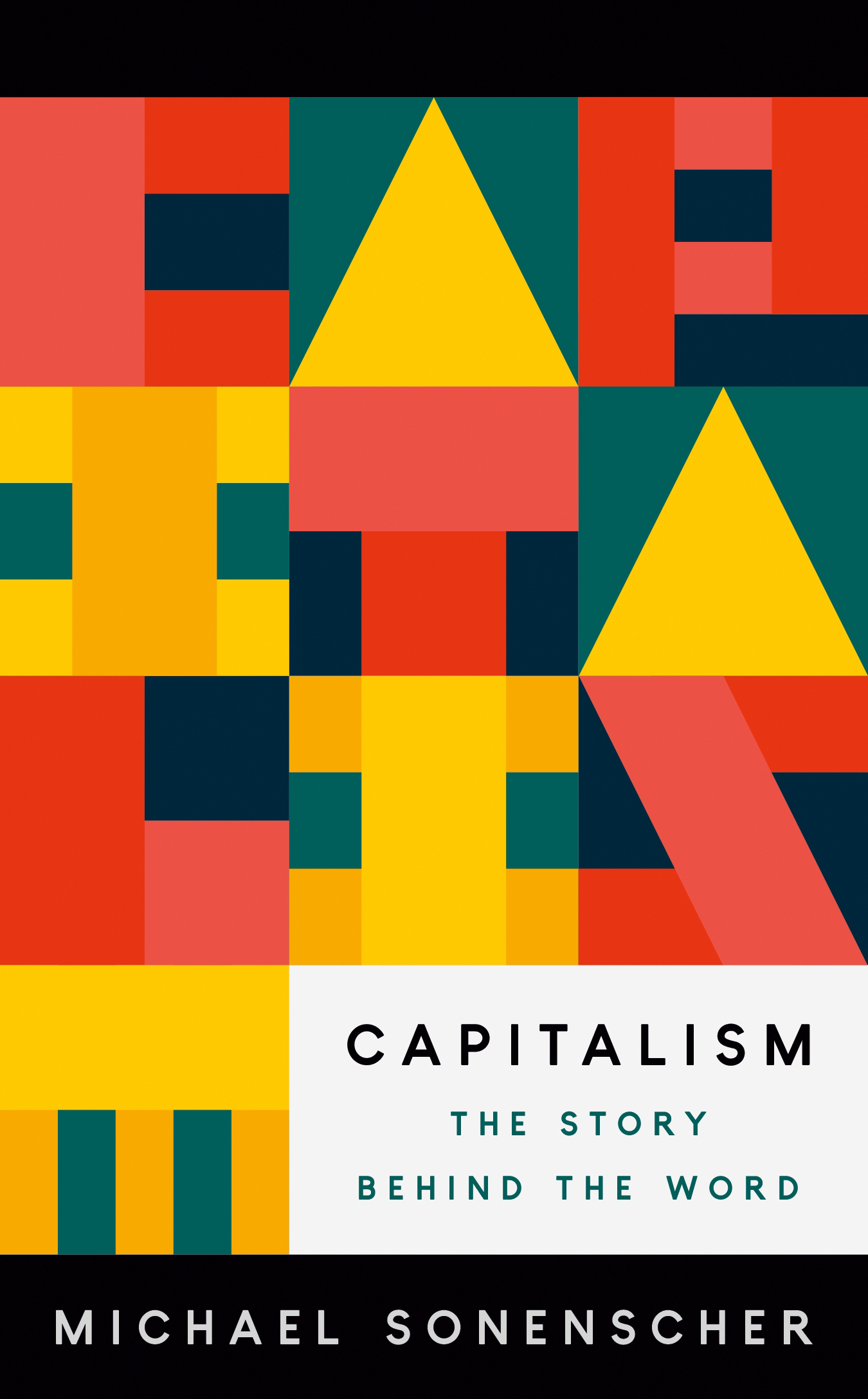CAPITALISM
Capitalism
THE STORY BEHIND THE WORD
MICHAEL SONENSCHER
PRINCETON UNIVERSITY PRESS
PRINCETON & OXFORD
Copyright 2022 by Princeton University Press
Princeton University Press is committed to the protection of copyright and the intellectual property our authors entrust to us. Copyright promotes the progress and integrity of knowledge. Thank you for supporting free speech and the global exchange of ideas by purchasing an authorized edition of this book. If you wish to reproduce or distribute any part of it in any form, please obtain permission.
Requests for permission to reproduce material from this work should be sent to
Published by Princeton University Press
41 William Street, Princeton, New Jersey 08540
99 Banbury Road, Oxford OX2 6JX
press.princeton.edu
All Rights Reserved
Library of Congress Cataloging-in-Publication Data
Names: Sonenscher, Michael, author.
Title: Capitalism : the story behind the word / Michael Sonenscher.
Description: Princeton, New Jersey : Princeton University Press, [2022] | Includes bibliographical references and index.
Identifiers: LCCN 2021059890 (print) | LCCN 2021059891 (ebook) | ISBN 9780691237206 (hardback) | ISBN 9780691238876 (ebook)
Subjects: LCSH: Capitalism. | CapitalismPolitical aspects.
Classification: LCC HB501 .S77425 2022 (print) | LCC HB501 (ebook) | DDC 330.12/2dc23/eng/20220224
LC record available at https://lccn.loc.gov/2021059890
LC ebook record available at https://lccn.loc.gov/2021059891
Version 1.0
British Library Cataloging-in-Publication Data is available
Editorial: Ben Tate and Josh Drake
Production Editorial: Lauren Lepow
Jacket Design: Karl Spurzem
Production: Danielle Amatucci
Publicity: Alyssa Sanford and Kate Farquhar-Thomson
CONTENTS
- vii
- xix
PREFACE
BEFORE THE EXISTENCE of both the concept and the reality of capitalism, there was once something called commercial society. This book is about the similarities and differences between the two terms, starting with the one that is the more recognisable. Capitalism, wrote the author of a book that was published with much the same title as this one, first in 1917 and then in 1927, is a political and polemical term that has no place in the language of scholarship. But, as one of his reviewers pointed out caustically, the assumptions underlying the claim seemed to mean, therefore, that words like religion, liberty, or patriotism also had no place in the language of scholarship because they too could be taken to be political and polemical terms. Nor, the same reviewer continued, did the polemical character of the term, or the fact that the word itself could not be found in the first volume of Karl Marxs Capital, amount to anything like a real obstacle to finding out how to understand the difference between a capitalist and a noncapitalist society. Capitalism might well be hard to define, but it was still quite easy to see.
Nothing much, it seems, has changed. Capitalism is a nineteenth-century word with a twenty-first-century charge. Although it is still quite hard to define, it remains quite easy to see. One reason for this mixture of the obvious and the opaque is the range of subjects encompassed by the word. Capitalism certainly calls for capital, but it is not quite so obvious that it also has to call for capitalists rather than, for example, organised businesses, managerial hierarchies, paid workers, multiple consumers, limited liability, incorporated stock, financial services, competitive markets, and bureaucratic states. Capitalism also seems to call for industrial organisation, technical specialisation, and the division of labour, but it is not quite so obvious that it also has to call for markets, prices, profits, and dividends. Capitalism, finally, seems to call for producers, products, and processes, but it is not quite so obvious that it also has to call for coercion, classes, and conflict. Sometimes it seems to have called for them all, but it seems never to have done so all at once or settled into something fixed and determinate all at the same time and all in the same place. Capitalism clearly has something to do with making things, whether making cars or making money, but capitalism itself is not ready-made.
Capitalism, in short, is a compound term. In this respect it has something in common with the many different clusters of concepts, values, and ideologies that have, for example, been given the names of communism, nationalism, socialism, liberalism, conservatism, feminism, imperialism, or environmentalism. Capitalism is one of them. Like them, it is a word that ends in -ism and, as a nineteenth-century dictionary put it, this means that it has a systemic quality. Words ending in ism, the dictionary noted, referring here to the word atheism, were systemative, meaning that they indicated a system, a doctrine, a way of acting, thinking or doing things. Behind the generic quality of the ending, however, there was still an endless variety of conceptual content and a ramifying array of overlapping genealogies of semantic origin. In this respect too, capitalism is one of them.
One of the aims of this book is to describe how the many heterogeneous components of the concept of capitalism came to be crystallised as a single word. This, in the first instance, calls for identifying where the different ingredients of the compound came from and, second, for explaining how, when, where, and why they came to be connected to and articulated with one another. Part of this story has already been told, initially by Richard Passow, the author of the book mentioned in the first paragraph of this preface, and in somewhat more detail in a now-forgotten article published in 1940 by a Swiss historian named Edmond Silberner in the prestigious French historical journal Annales edited by Marc Bloch and Lucien Febvre. In this article, Silberner showed that capitalism began as a French word, coined in the ninth, 1850, edition of a famous pamphlet by the French socialist Louis Blanc entitled Organisation du Travail (or The Organisation of Labour as the English-language translation was entitled).
It is not usual now to think of capital and capitalism as mortal enemies. One of the further aims of this book is to try to show what this meant and begin to explain why the conceptual opposition on which it was based has come to look so strange. The initial reason for both can, however, be set out briefly here. This is the fact that Silberners discovery was not entirely accurate because, long before Louis Blanc made use of the term in 1850, both the word and the concept of capitalism were initially associated with the related subjects of power politics, war finance, and public debt. The word capitalist actually began as an eighteenth-century French word (capitaliste) that was usually applied to someone who lent money to one or other of the many branches of the French royal government to fund the costs of war. The original English-language equivalent of a capitaliste was, therefore, an annuitant or a stockholder rather than a capitalist. The English word came later. As will be shown in later chapters, the opposition between capital and capitalism on which Louis Blanc drew was bound up with this earlier usage. Gradually, however, the earlier usage also came to be bound up with a number of other clusters of concepts, values, and ideologies that, cumulatively and sequentially, came to form the moral and political context in which both the word and the concept of capitalism first arose. Some were connected to the subjects of property, inequality, and what came to be called the social question. Others were connected to the subjects of industry, the division of labour, and global trade. Still others, however, continued to be connected to the subjects of money, credit, and public debt. From the vantage point of eighteenth-century usage, however, capitalism did not have to wait for the publication of


